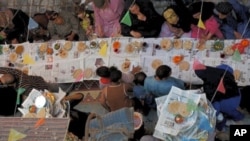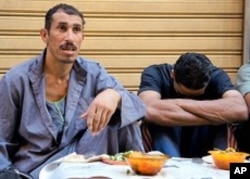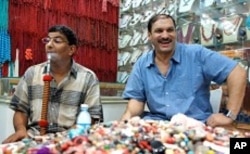Many of Cairo's poor are spending this Ramadan, the Islamic month of spiritual devotion, coping with such worldly problems as electricity shortages, stifling heat and rising prices. But a small reprieve can be found nightly at charity tables set up around the capital that feed all comers.
At one "Table of the Merciful," tucked in a corner of the Old City's Khan al-Khalili bazaar, the women gather first, even before planks are raised as makeshift tables. They sit patiently on the cobblestones, occasionally reining in a boisterous baby who crawls among them. It's still an hour until the call to prayer will end the day's fast.
How tradition started
On a rooftop terrace three floors above, Essam Rashad stands stirring a massive pot of peas. He checks on an equally impressive pan of rice and platters full of meat - all part of the iftar meal he is hosting for the dozens of people below.
A gem dealer, Rashad is somewhat of an accidental benefactor. One night during Ramadan 15 years ago, he was stuck in traffic and missed iftar at home. The next night, he decided to eat at his shop and asked some friends to join him. The following night more people came, the next even more, and his life as an iftar host began.
It's a venerable Egyptian tradition, made more visible in recent decades by actors and other celebrities hiring top chefs in well-publicized fulfillment of the Islamic duty of charity. Those over-the-top affairs highlight a paradox of Ramadan in Egypt, where lavish banquets during the month of fasting push national food consumption three times above the norm.
Who benefits?
But most "Tables of the Merciful" are like Rashad's, with simple, well-cooked meals offered humbly on newspaper. Like the drinking water dispensers found throughout the capital, they are gifts largely of unsung patrons. All are welcome, as the anticipation of the coming meal makes clear.
With one in five Egyptians living on less than a dollar a day, such benevolence is indeed seen as godsend. In addition to the unemployed, there are the underpaid - policemen, workers - who turn out for a place at the table. Rashad's friend and fellow gem dealer, Yussef, says despite government subsidies, rising prices have hit hard.
"[Essam] told me when he used to make the food, he used to throw half of it in the garbage," Yussef says. "Today, everyone is looking for rice. I think a lot of people have hunger. There is a lot of problems in the economy."
Motivation
Of course, the "Tables of the Merciful" also offer a sense of community, which is much appreciated by guests including Abdel Kader Mohamed Abdel Kader, who has been spending Ramadan at such tables for 40 years. Kader praises the tradition, saying it brings people together to eat and drink, and feel the spirit of the holy month.
As for Rashad, who makes the meal each of the 30 nights of Ramadan, he believes the blessings he receives from his good deed account for how well his four daughters have turned out, and how much his business has grown. He says he could have earned the same rewards had he simply donated money to charity and let others do the work. But he says there are some people who like to go through the effort, who want to serve people. He says "that kind of person enjoys it when someone says 'I want a different piece of bread', or 'do this or do that for me.' His back might ache," Rashad adds, "but he loves it."






